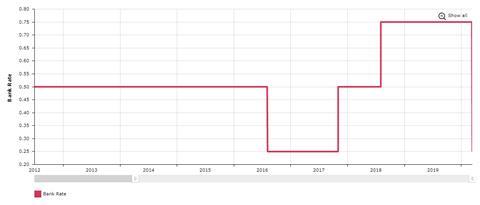Rishi Sunak’s Budget due this afternoon

The Bank of England has announced an emergency interest rates cut to 0.25% from 0.75% this morning in response to the global economic slowdown caused by the coronavirus outbreak.
The cut brings interest rates down to the lowest level since the aftermath of the 2016 EU referendum, and is the first emergency rate cut since the the 2008 financial crisis.
The move comes as chancellor Rishi Sunak is expected to spend a “historic” amount on infrastructure over the next five years.
The money will be spent on roads and rail along with broadband and scientific research with further details expected to be outlined in his Budget later today.
The government has promised to “level-up” the UK following the Tories’ general election win last December and Sunak is expected to tells MPs this afternoon: “We will rebalance opportunities and lay the foundations for a decade of growth for everybody.”
It comes as industry leaders reacted with dismay to news that the long-awaited National Infrastructure Strategy was to be delayed again.
The strategy, which is set to outline the government’s approach to a £100bn programme of infrastructure investment over the next 30 years, had been expected in today’s Budget but last week it was reported that a further wait was necessary.

“Boris played his hand early on big infrastructure with a pitch to launch a ‘revolution’ and committing £100bn – so it’s ironic that the National Infrastructure Strategy is now delayed,” said Ben Lewis, infrastructure and energy director at Barton Wilmore.
While the Budget is still due to contain key announcements on infrastructure, the details and timetables for how a series of major projects will be funded are now expected to be published at a later date, thought to be in late April or early May.
First promised in 2018 and repeated in last year’s Conservative election manifesto, the strategy was set to include £4bn for flood defences and £29bn in strategic and local roads. Major transport projects such as HS2, Northern Powerhouse Rail were also expected to be included, along with devolved spending powers for combined authorities. A bridge between Scotland and Northern Ireland had also been mentioned by the prime minister.
The latest delay is expected to give Sunak (pictured) time to refocus the strategy to take advantage of a shake-up to fiscal rules under way since the departure of his predecessor Sajid Javid last month.
This could mean increased resources for infrastructure, a central element of Boris Johnson’s “levelling up” agenda, when the strategy is eventually published.
Still waiting
July 2018
The National Infrastructure Commission publishes the National Infrastructure Assessment, its recommendations for how the government should invest in infrastructure over the next 30 years
October
In the Budget, chancellor Philip Hammond confirms plans to publish the government’s response during 2019
March 2019
Hammond reiterates the government’s commitment to publishing its strategy this year
September
New chancellor Sajid Javid reaffirms the government’s commitment to the strategy in his September spending round, promising to set out more details in the autumn Budget
October
Autumn Budget is cancelled as the prime minister Boris Johnson prepares to announce a December general election.
November
Strategy is again promised in the Conservative election manifesto
January 2020
Chief secretary to the Treasury Rishi Sunak confirms the strategy will be published alongside the Budget
February
Sunak becomes chancellor after Javid’s resignation
March 2020
Strategy reported to have been delayed until May
The chancellor could also be looking to reassess the National Infrastructure Commission’s recommendations following uncertainty around the Heathrow expansion project. It was ruled illegal by the court of appeal last month for not taking into account the Paris climate agreement.
In light of this judgment, which the government has decided not to appeal against, Sunak may now be making changes to ensure that major projects can be delivered in line with the government’s net-zero carbon pledge.
Industry experts expressed consternation at another delay to the strategy, which was repeatedly pushed back during a year and a half of parliamentary turmoil due to Brexit. “While we recognise there is a new chancellor and that naturally, he will want to review it, Britain has been waiting a long time for progress,” said Chris Richards, head of policy at the Institution of Civil Engineers.
Though Sunak has been the chancellor for just over four weeks, his former role as chief secretary to the Treasury means that he is likely to be familiar with the assessment’s recommendations.
Richards added that the Budget “should therefore set out the specific sticking points holding back publication of the strategy, outlining where further evidence is required”.
In a statement released by the National Infrastructure Commission, chair John Armitt said: “Naturally, we are disappointed about the further delay.”
But he added that he was encouraged by the commitment shown by the government to long-term infrastructure investment. “If a short delay leads to a better strategy that more comprehensively addresses our recommendations, it will be worth the wait,” he said.
What they said about the delay
I suspect it’s incompetence. The government clearly hadn’t assessed infrastructure plan proposals against the Paris Agreement and, after the Heathrow decision, are panicking they could face a legal challenge
John McDonnell, shadow chancellor
We’re eager to see the content of the NIS. It will be crucial to tackling the big challenges this government has set for driving towards net-zero carbon and levelling up the economy
Denise Bower, group external engagement director, Mott MacDonald
Delay is not too big an issue. Better to be right than quick
Alasdair Reisner, chief executive, Civil Engineering Contractors Association
We need a genuine step change in approach. In modern times, the UK has fallen victim to a pattern of prevarication and paralysis on major infrastructure decisions
John Armitt, chair, NIC, in a speech to the All-Party Parliamentary Group on infrastructure in February.



























No comments yet